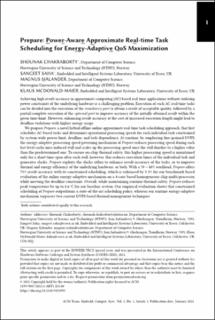| dc.description.abstract | Achieving high result-accuracy in approximate computing (AC) based real-time applications without violating power constraints of the underlying hardware is a challenging problem. Execution of such AC real-time tasks can be divided into the execution of the mandatory part to obtain a result of acceptable quality, followed by a partial/complete execution of the optional part to improve accuracy of the initially obtained result within the given time-limit. However, enhancing result-accuracy at the cost of increased execution length might lead to deadline violations with higher energy usage. We propose Prepare, a novel hybrid offline-online approximate real-time task-scheduling approach, that first schedules AC-based tasks and determines operational processing speeds for each individual task constrained by system-wide power limit, deadline, and task-dependency. At runtime, by employing fine-grained DVFS, the energy-adaptive processing speed governing mechanism of Prepare reduces processing speed during each last level cache miss induced stall and scales up the processing speed once the stall finishes to a higher value than the predetermined one. To ensure on-chip thermal safety, this higher processing speed is maintained only for a short time-span after each stall, however, this reduces execution times of the individual task and generates slacks. Prepare exploits the slacks either to enhance result-accuracy of the tasks, or to improve thermal and energy efficiency of the underlying hardware, or both. With a 70 - 80% workload, Prepare offers 75% result-accuracy with its constrained scheduling, which is enhanced by 5.3% for our benchmark based evaluation of the online energy-adaptive mechanism on a 4-core based homogeneous chip multi-processor, while meeting the deadline constraint. Overall, while maintaining runtime thermal safety, Prepare reduces peak temperature by up to 8.6 °C for our baseline system. Our empirical evaluation shows that constrained scheduling of Prepare outperforms a state-of-the-art scheduling policy, whereas our runtime energy-adaptive mechanism surpasses two current DVFS based thermal management techniques. | en_US |
